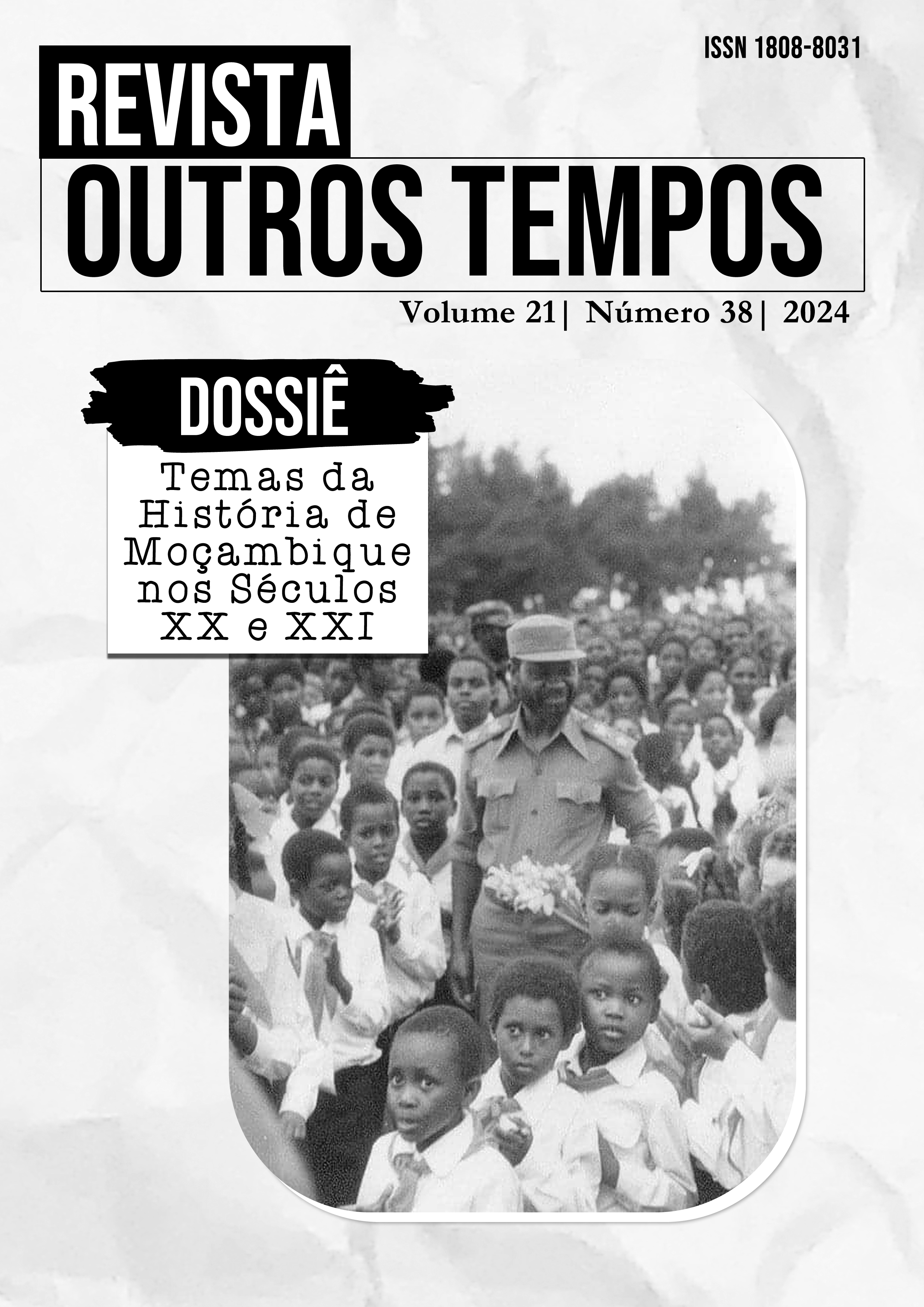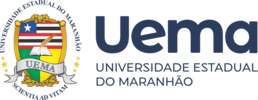A INSTRUMENTALIZAÇÃO DOS CHEFES COSTUMEIROS PELOS PARTIDOS POLÍTICOS, GOVERNO E O ESTADO, EM CONTEXTOS ELEITORAIS NO DISTRITO DE HOMOÍNE (MOÇAMBIQUE), 1994 – 2014
DOI:
https://doi.org/10.18817/ot.v21i38.1152Palavras-chave:
Chefs costumeiros. , Partidos politicos. , Eleições.Resumo
O presente artigo explora a complexa dinâmica da instrumentalização dos chefes costumeiros pelos partidos políticos, governo e Estado, nos processos eleitorais em Homoíne (Moçambique). Quase que unanimemente descritos como auxiliares administrativos da administração colonial, os chefes costumeiros – mais especificamente os régulos, cabos e indunas – representam no imaginário social e ideológico da FRELIMO pós-independência, o tipo de sociedade a eliminar – a dita tradicional. Na sequência, as estruturas de matriz costumeira estabeleceram novas alianças políticas no contexto da guerra civil, o que conduziu a dinâmicas complexas no âmbito dos processos eleitorais pós-conflito. O artigo resulta de quatro fontes principais: a imprensa, legislação, fotografias e a oralidade – entrevistas. Não buscamos afirmar de maneira peremptória que os resultados eleitorais têm sido determinados pela influência manipuladora exercida pelas lideranças locais. Procuramos demonstrar que a sua participação parcial e seu posicionamento político foi desempenhando um papel de considerável peso nas escolhas partidárias das comunidades – o que justifica a nosso argumento – que associa – de alguma forma – a mudança de partido do Regulo Machavele em 1999 – por exemplo, com a perda de campo da RENAMO naquele regulado e não só. É na virada do século, a partir da década de 2000 – precisamente com a aprovação e implementação do Decreto 15/2000, que se delineiam alterações marcantes nas opções e posicionamentos políticos dos líderes. Essas mudanças, por sua vez, vincam ainda mais a influência iniciada na década 1990, nos resultados eleitorais. Este fenômeno, ao se refletir de alguma maneira nos resultados das eleições, ressalta a importância de uma análise aprofundada das nuances que permeiam a interação entre os chefes costumeiros, os atores políticos institucionais e as dinâmicas eleitorais locais.
Downloads
Referências
Imprensa, relatórios e diversos
ADMINISTRAÇÃO Conjunta Vai Vigorar no País. Notícias, 21 jun. 1995.
AP-ARCHIVE. Mozambique: election preparations, 23 set. 1994.
CHISSANO quer os líderes tradicionais. Domingo, 27 out. 1996.
COMISSAO NACIONAL DE ELEICOES. Resultados eleitorais, 1994.
COMISSAO NACIONAL DE ELEICOES. Resultados eleitorais, 1999.
DIÁRIO DE MOÇAMBIQUE. África do Sul responsável pelo massacre de Homoíne, 23 jul. 1987.
DIÁRIO DE MOÇAMBIQUE. Bandidos armados cometem massacre em Homoíne: 380 pessoas no sábado assassinadas. Doentes internados no hospital entre as vítimas, 22 jul. 1987.
DIÁRIO DE MOÇAMBIQUE. Boers não têm coração: Primeiro-Ministro Machungo ao falar do massacre de Homoíne, 25 jul. 1987.
GOVERNO Em Campanha Eleitoral Aumentar "Tako" Para Autoridades Comunitárias.
Verdade, 8 ago. 2019.
MACHEL, Samora. Guerra contra o inimigo. Disponível em: https://www.youtube.com/watch?v=SRMTOxGqVEE&t=18s Acesso em:
MOZAMBIQUE: National Election Preparations. Ap Archive, 21 jul. 2015. Disponível em: https://www.youtube.com/watch?v=jCTxZVnb-b0 Acesso em: 14 jun. 2022.
Notícias, 12 ago. 1998.
Noticias, 17 jul. 1995.
Notícias, 18 jul.1997.
Noticias, 29 out. 1999.
Legislação
CONSELHO DE MINISTROS. Decreto n. 15/2000, de 20 de junho de 2000. Estabelece as formas de articulação dos órgãos locais do estado com as autoridades comunitárias. Boletim da República, n. 24, série 1, 20 jun. 2000.
MINISTÉRIO DO ULTRAMAR. Decreto-Lei n. 39.666, de 20 de maio de 1954. Estatuto dos indígenas portugueses das províncias da Guiné, Angola e Moçambique. Diário da República, n. 110, série 1, 1954.
MINISTÉRIO DO ULTRAMAR. Decreto-Lei n. 39.668, de 20 de maio de 1954. Regula a admissão ao exame do 2ª ciclo por disciplinas singulares no Liceu Afonso de Albuquerque [...]. Diário da República, n. 110, série 1, 1954.
MOÇAMBIQUE. Constituição de 11 de abril de 1933.
MOÇAMBIQUE. Constituição da República Popular de Moçambique, 1975.
MOÇAMBIQUE. Acordo Geral de Paz de Moçambique, 1990.
Bibliografias
ALBERTO, Dercio Carlos. A Terra Como ‘bem coletivo’ no vale do Incomati: Estratégias de acesso, posse e partilha da terra nas associações agrárias de Marracuene (Moçambique)”. Revista Campo-Território, Uberlândia, v. 18, n. 50, p. 306-30, 2023. DOI: https://doi.org/10.14393/RCT185069762 Acesso em: 14 nov. 2023.
AMSELLE, Jean-Loup. Ethnies et espaces: pour une anthropologie topologique. In: AMSELLE, Jean-Loup; M’BOKOLO, Elikia (ed.). Au cœur de l’ethnie: Ethnies, tribalisme et États en Afrique. Paris: La Découverte,1985. p. 11 – 48.
AMSELLE, Jean-Loup. « L’ethnicisation de la politique (suite) ». Lignes, n. 55, p. 137-148, 2018/1 DOI: 10.3917/lignes.055.0137. Disponível em: https://www.cairn.info/revue-lignes-2018-1-page-137.htm Acesso em: 12 ago. 2022.
AMSELLE, Jean-Loup; M’BOKOLO, Elikia (ed.). Au cœur de l’ethnie: Ethnies, tribalisme et États en Afrique. Paris: La Découverte,1985.
BAYART, Jean-François. Postcolonial Studies: A Political Invention of Tradition? Ab Imperio, v. 2, n. 2, p. 65-96, 2013
CAHEN, Michel. Les bandits armés du Mozambique: de la légitimité dans une guérilla de droite, 20 & 21. Revue d'histoire, v. 141, n. 1, p. 128-141, 2019.
CAHEN, Michel. La Renamo à l’heure de sa sixième défaite aux élections générales (15 octobre 2019). Politique africaine, v. 160, n. 4, p. 187-209, 2020.
CHRETIEN, Jean-Pierre. Hutu et Tutsi au Rwanda et au Burundi. In: AMSELLE, Jean-Loup; M’BOKOLO, Elikia (ed.). Au cœur de l’ethnie: Ethnies, tribalisme et États en Afrique. Paris: La Découverte, 1985. p. 129 -165
CHRETIEN, Jean-Pierre. L’Afrique des Grands Lacs: Deux mille ans d’histoire. Paris: Aubier, 2000.
CONNAN, Dominique; SIMéANT-GERMANOS, Johanna. « John Lonsdale, le nationalisme, l'ethnicité et l'économie morale: parcours d'un pionnier de l'histoire africaine. Entretien avec Dominique Connan et Johanna Siméant ». Genèses, n. 83, p. 133-154, 2011-2012. DOI: 10.3917/gen.083.0133. Disponível em: https://www.cairn.info/revue-geneses-2011-2-page-133.htm Acesso em: 24 mar. 2023.
FORQUILHA, Salvador Cadete. Des «autoridadesgentílicas» aux «autoridadescomunitárias»: le processus de mobilisation de la chefferie comme ressource politique: État, chefferie et démocratisation au Mozambique: le cas du district de Cheringoma. 2006. Tese (Doutorado em Ciencia Politica) - Institut d'études politiques de Bordeaux, Bordeaux, 2006.
FORQUILHA, Salvador Cadete. O Paradoxo da Articulação dos Órgãos Locais do Estado com as Autoridades Comunitárias em Moçambique: Do discurso sobre a descentralização à conquista dos espaços políticos a nível local. Maputo: Instituto de Estudos Sociais e Económicos – IESE, 2009.
GEFRAY, Christian. A Causa das Armas em Moçambique: Antropologia da Guerra Contemporânea de Moçambique. Maputo: Edições Afrontamento. 1991.
HOBSBAWM, Eric; RANGER, Terence. The Invention of Tradition. Cambridge: Cambridge University Press, 1983.
MAE – Ministério da Administração Estatal. Perfil do Distrito de Homoine, Província de Inhambane, Edição 2005. Série Perfis Distritais. Maputo: MAE, 2005.
PASSADOR, Luiz Henrique. Guerrear, casar, pacificar, curar: o Universo Da "tradição" e a Experiência Com O HIV/Aids No Distrito De Homoíne, Sul De Moçambique. 2011. Tese (Doutorado em Antropologia Social) – Universidade de Campinas, Campinas, 2011.
PERROT, Claude-Hélène. Introduction. In: PERROT Claude-Hélène; FAUVELLE-AYMAR François-Xavier (org.). Le retour des rois: Les autorités traditionnelles et l’État en Afrique contemporaine. Paris: Karthala, 2003. p. 7-24.
RITA-FEREIRA, António. Crenças e práticas mágicas em Homoíne (Moçambique): Boletim de Instrumentos de Investigação cientifica de Moçambique. Lourenço Marques: Instituto de Investigação Científica de Moçambique, 1960.
TUNGA-BAU, Héritier Mambi. Pouvoir traditionnel et pouvoir d’Etat en République Démocratique du Congo: Esquisse d’une théorie d’hybridation des pouvoirs politiques. Kinshasa: MEDIASPAUL, 2010.
VAUGHAN, Olufemi. Les chefs traditionnels face au pouvoir politique. Politique africaine, n. 32, p. 44-56, 1988.+++
Downloads
Publicado
Como Citar
Edição
Seção
Licença
Copyright (c) 2024 DÉRCIO CARLOS ALBERTO

Este trabalho está licenciado sob uma licença Creative Commons Attribution-NonCommercial-NoDerivatives 4.0 International License.

Outros Tempos - Pesquisa em foco - História de http://www.outrostempos.uema.br/site/ é licenciado sob uma Licença Creative Commons Atribuição-NãoComercial-SemDerivados 3.0 Brasil.






